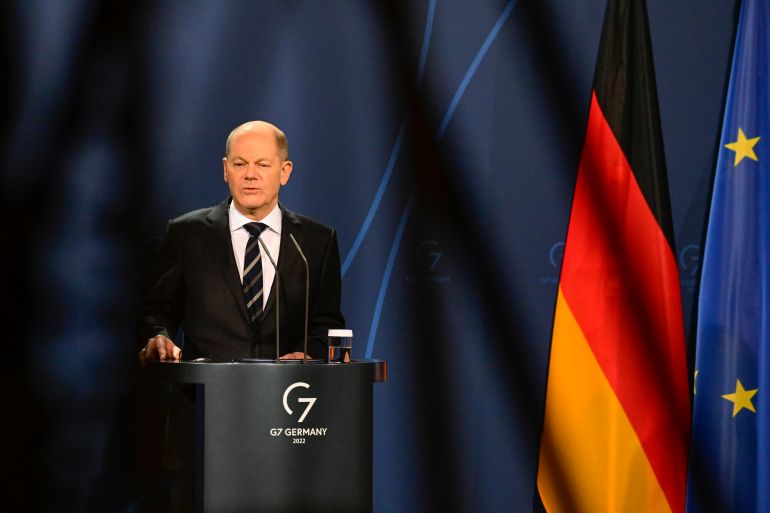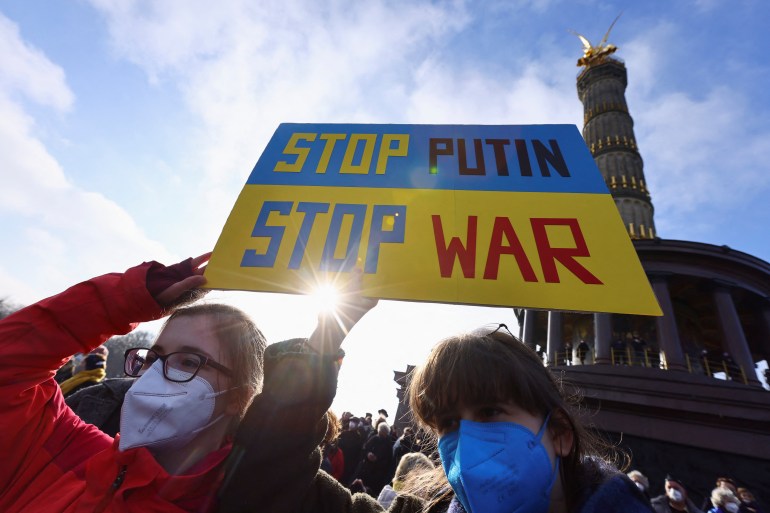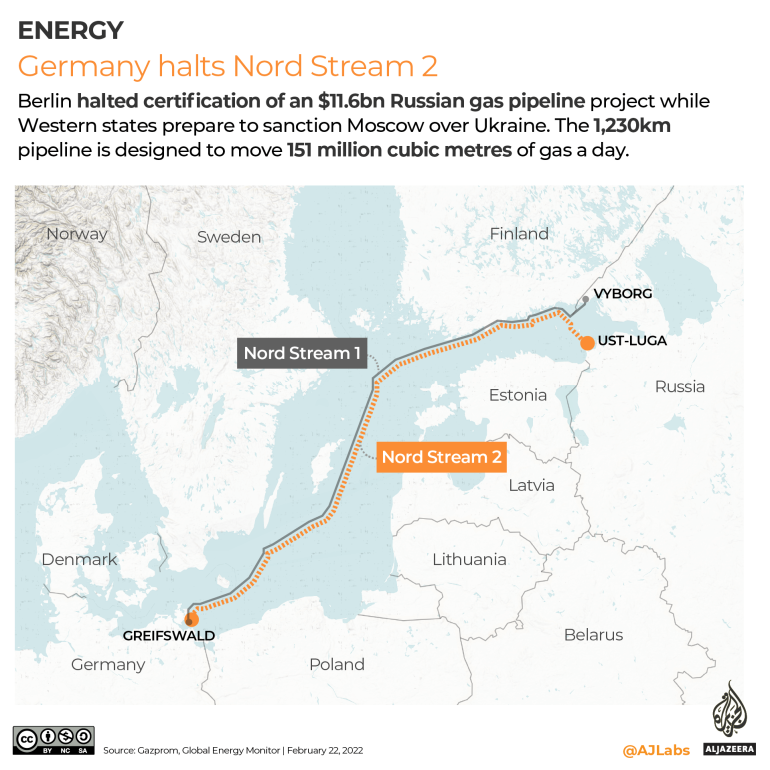What U-turn on defence, energy policy means for Germany
Germany reverses its ban on supplying lethal weapons to conflict zones, beefs up its defence spending and suspends the controversial Russian-owned gas project, Nord Stream 2.

Brussels, Belgium – The winds of change blew over Germany’s defence and energy policies this week after the German government reversed its ban on supplying lethal weapons to conflict zones and beefed up its defence spending.
In an effort to deter the conflict in Ukraine, German Chancellor Olaf Scholz announced that 100 billion euros ($113bn) would be reserved for military spending.
Keep reading
list of 3 itemsGermany pauses Nord Stream 2 certification process over Ukraine
Nord Stream 2 halted: What you should know
Speaking at a special session at the German Parliament in Berlin over the weekend, he said: “There was no other response possible to [Russian President Vladimir] Putin’s aggression. In attacking Ukraine, Putin doesn’t just want to eradicate a country from the world map, he is destroying the European security structure.”
Berlin has agreed to send 1,000 anti-tank weapons and 500 stinger missiles to Ukraine to deter Russian military forces in Ukraine.
Four hundred anti-tank rocket launchers will also be delivered to Ukraine through the Netherlands. Estonia also won Germany’s approval to supply nine German-origin Howitzer weapons to Kyiv.
‘Keep it up’
Applauding the decision, Ukraine’s President Volodymyr Zelenskyy said on Twitter: “Keep it up, Chancellor Olaf Scholz! Anti-war coalition in action!”
But up until last week, the country’s coalition government embraced a softer line towards the crisis in Ukraine, citing Germany’s world war legacy guilt as the reason behind its restrictive arms export policy.
Harry Nedelcu, policy director at Rasmussen Global, told Al Jazeera the sudden shift in Germany’s defence policy occurred because of the severity of the crisis in Ukraine.
“In his 45-minute bizarre televised rant trying to justify his actions, Putin blamed anyone from the Ottoman Empire to [the first Soviet leader Vladimir] Lenin. So perhaps it’s fitting here to actually quote Lenin, who wrote: ‘There are decades when nothing happens; and there are weeks when decades happen,'” Nedelcu said.
This war has been such a big shift for European security that it has awakened the German government to “make a complete U-turn in its foreign and security policy and break with its traditionally cautious position within a week”, he told Al Jazeera.

Welcoming Scholz’s announcements, Dr Stefan Meister, Russia expert at the German Council on Foreign Relations, told Al Jazeera: “I think this new stance not only signals the end of the [former German Chancellor Angela] Merkel era but the end of the ‘Ostpolitik’ of the last 30 years.”
The “Ostpolitik” or New Eastern Policy was initiated in 1969, seeking to ease relations between the Federal Republic of Germany (West Germany) and the German Democratic Republic (East Germany).
Possible repercussions
After being criticised for watching the crisis unfold from the sidelines, Scholz also highlighted how Germany is one of the EU’s major military nations that is willing to act, at the German parliament’s special session on Ukraine.
He committed to investing more than 2 percent of gross domestic product (GDP) in defence.
Stefan Scheller, an associate fellow at the German Council on Foreign Relations, said the chancellor has not proclaimed Germany a military leader, but rather, a reliable partner in Europe.
“On one hand, we see a clear paradigm shift of German security policy with a boost in defence spending no one expected. On the other hand, the German Armed Forces are in a deplorable state,” he told Al Jazeera.
“The ironic bit about it is certainly that the current governing parties, especially the Social Democrats, were the first during the past legislative terms to prevent the German Armed Forces from being equipped appropriately. But the public seems to agree with the current policies,” he said.

Moreover, being one of NATO’s strongest economies, Germany has also been criticised in the past by the United States for investing less than 2 percent of its GDP in bolstering the alliance’s defence agreements.
Rasmussen Global’s Nedelcu said a stronger NATO requires more than just financial commitments.
“A stronger NATO will only happen when NATO countries (including Germany) stop hiding behind institutional inertia and give Ukraine a membership action path, and also welcome countries like Sweden and Finland,” he told Al Jazeera.
While Scholz’s announcements come after he realised that the Russian invasion of Ukraine threatens Germany and Europe’s entire post-war order, Ivana Stradner, a fellow at the American Enterprise Institute who works on Russia and cybersecurity, said Germany’s new defence stance will not really threaten Putin.
She highlighted that repercussions in the near future could include threats in cyberspace.
“Putin has lost many allies in Europe and Germany was one of the most important. I have little doubt that Putin will retaliate – likely asymmetrically – in cyberspace. This is Moscow’s typical playbook. It’s been used before and the EU must be ready to defend itself and strike back against Moscow’s cyber provocations,” she told Al Jazeera.
Nord Stream 2
Besides heralding a new defence era, Germany also took a U-turn in its energy policies by suspending the controversial Russian-owned gas project, Nord Stream 2.
Reacting to its suspension, Dmitry Medvedev, Russia’s former president and now deputy chairman of its Security Council said on Twitter: “Welcome to the brave new world where Europeans are very soon going to pay €2,000 for 1,000 cubic metres of natural gas!”
Yet, Germany’s economy minister Robert Habeck assured reporters in Dusseldorf last week that the country’s gas supply was secure even without Nord Stream 2.
The German Council on Foreign Relations’ Meister thinks Nord Stream 2 is now dead, adding that “it was not crucial for gas supply in Germany”.
“We will have further discussions on nuclear power stations and coal power stations, which will be very controversial for German society,” he told Al Jazeera.

Scholz has announced that Germany will be building two liquified natural gas (LNG) terminals in the regions of Brunsbuettel and Wilhelmshaven with an aim of transitioning towards a more sustainable future.
“The events of the past few days have shown us that responsible, forward-looking energy policy is decisive not only for our economy and the environment. It is also decisive for our security,” Scholz told German lawmakers in the special session of the German parliament.
Wake-up call
Rasmussen Global’s Nedelcu said Russia’s invasion of Ukraine has also paradoxically reawakened Germany’s policies towards renewable energy infrastructure.
“The EU’s green deal experienced a hype in member states, including Germany, as soon as it was announced. But after a while, realism set in and green policies had to be watered down,” he told Al Jazeera.
“In the short-term, Germany might consider keeping some energy sources on the table – like nuclear and coal – to meet immediate demand. However, in the long term, Putin might have in fact reignited conversations in the country about the need to switch to more renewable energy resources after the suspension of the Nord Stream 2 project,” he said.
Yet, Stradner thinks Germany’s wake-up call should have come a long time ago.
“Western European nations haven’t suffered a major war since World War II and accordingly haven’t taken security seriously – relying instead on US protection. Scholz initially considered Ukraine solely from an isolationist perspective. But after Putin launched an aggressive attack in Ukraine, German Chancellor Scholtz had few options,” she told Al Jazeera.
“The world is very divided now and the worst thing for Germany’s reputation would be to support the authoritarian regime of Vladimir Putin and find itself on the wrong side of history,” she said.